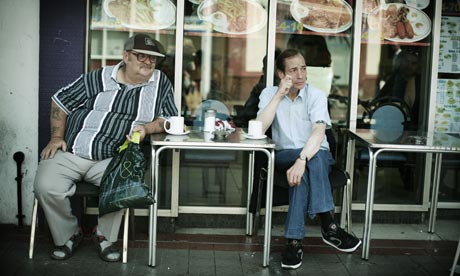
If he won the Lottery tomorrow, Martin James says he would up sticks to north Wales, buy a smallholding with his family and stay there for the rest of his life, looking out to sea.
"You can walk out every day there and, whether it's hot or cold, you're somewhere beautiful," he says, wistfully. For the moment, though, the 42-year-old is standing on an Essex industrial estate in oil-stained rubber gloves, and, if statistics are to be believed, he has won neither the National Lottery nor the lottery of life.
For James lives in Thurrock, the unitary authority in south-east England that recorded the lowest levels of life satisfaction of any place in the UK in the government's wellbeing survey, released on Tuesday.
And, although a trained mechanic and manager, he often spends the day driving forklift trucks – a job which, according to the statistics, brings people the least life satisfaction of any kind of work going. When asked how satisfied they were with their lives, more than a quarter of respondents in the "process, plant and machine operatives" category gave a rating that was low or very low.
For James, the findings are unsurprising, although since becoming a part-time manager, life has become less of a struggle and good enough, he says, to warrant a positively exuberant 8 out of 10 on the satisfaction scale. But his job still sometimes means he spends eight or nine hours a day driving a truck – a pattern he believes led to the formation of a blood clot in his leg earlier this year. The worst thing about it all, he says, is the nightshifts. "You're leaving for work just as the kids are coming home from school. There's no family life there. If you were being paid thousands more it'd be OK. But you're not," he says. "It's relentless."
Not everyone would agree with him. Stepping down from his JCB on the outskirts of west Thurrock, Tony says he has been a plant operative ever since he was 18. He's 65 now and still working 50 or 60 hours a week. "I think most plant men are happy enough, apart from the never-ending paperwork," he says. "I'm quite happy with what I'm doing." His boss, Mick Dickinson, says he considers the government's wellbeing project – a scheme designed to measure national progress more effectively than GDP – a waste of time and money, or, as he says, "a crock of shit".
With an average life satisfaction rating of 7.09, Thurrock emerged from the Office of National Statistics' report as the country's capital of misery, far behind the lucky people of Eilean Siar, Orkney and Shetland, who recorded an average of 8.1. Like several other areas which have experienced de-industrialisation in recent decades, Thurrock also scored badly on the question which asked respondents how worthwhile they considered their lives, and gave one of the highest ratings for anxiety levels outside of London. So why the gloom? Or are the statistics painting a false portrait?
Fred, a 62-year-old taxi driver who remembers starting work as a teenager in a breeze block factory in west Thurrock where new-build houses now sit, thinks he knows. "It's one big cesspit here. I don't live here because I want to; I live here because I have to," he says. He complains about the area being "literally flooded with foreigners" and says this has had a squeeze effect on housing and jobs, a claim vigorously disputed by the authorities.
In a part of south-east England where the English Defence League and the British National Party are active, he is not alone. Sitting outside a café near the JobCentrePlus in Grays, Pat, a retired industrial cleaner, speaks of her resentment of immigrant workers who she says are prepared to do the same jobs as locals for less money. "You get used to a certain standard of living," she says. "But that leaves the likes of my sons and my husband on the dole. What chance to people born and bred here, what chance do they stand? You've got more chance of a house if you've just moved into the country. That's what annoys you. You'll find the majority of us feel like that."
James has heard all the stories before, but refuses to entertain such attitudes. Even for him, though, Thurrock has lost its charm. "It's OK," he says, "but it seems to have gone downhill." He worries about his daughters, aged 10 and 13, growing up in a part of the world where crime seems to be rife. "You look at the Thurrock Gazette and it's all murders, stabbings," he says. "Every other night there are helicopters overhead."
Perhaps some of Thurrock's more dejected residents should consider taking a leaf out of Mary Lowe's book: the 59-year-old was born and bred in the area and rates her life satisfaction at 9/10. Despite being unemployed and, like 4.5% of people in the area, having signed on as a jobseeker, she describes herself as a happy person and insists that Thurrock has a lot to offer – chiefly Lakeside, the shopping and entertainment complex in Grays, and the beach, which her eight grandchildren enjoy.
What's her secret? Age, for one thing, she says. "Once your children have grown up you haven't got to worry as much." But being divorced, it turns out, is her main source of exhilaration. "That's what makes me happy," she cackles, laughing in the face of the ONS data which suggests divorcees are far more likely to be miserable than those in marriages or civil partnerships. "That's probably why I said 9," she says.

